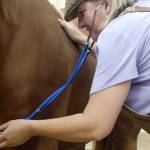Atrial Fibrillation May Be Heritable in Standardbred Horses

One of the most common heart problems affecting equine performance is atrial fibrillation, or “a-fib.” This is a condition in which the upper chambers of the horse’s heart may beat up to 400 times a minute. Though these chambers are contracting almost nonstop, the rapid fluttering action does not produce significant circulation of blood into the lower chambers. Without effective circulation to supply oxygen and remove waste materials, horses can’t sustain a high level of performance.
Any horse can have short periods of a-fib that aren’t detected and don’t cause an obvious problem.
Atrial fibrillation sometimes occurs when horses race, usually resolving on its own during the cooling-out period.
In a study conducted at the Ontario Veterinary College Health Sciences Centre, scientists reviewed the records of over 40,000 horses and found that 1%, or around 400 horses, had a-fib. Among the breeds represented in the sample, a disproportionate number of horses with a-fib were Standardbreds. Tabulation of the results showed that horses in this breed were from 4 to 11 times more likely than those of other breeds to develop a-fib. Horses from certain sires were at an even higher risk, suggesting that this condition can be inherited








